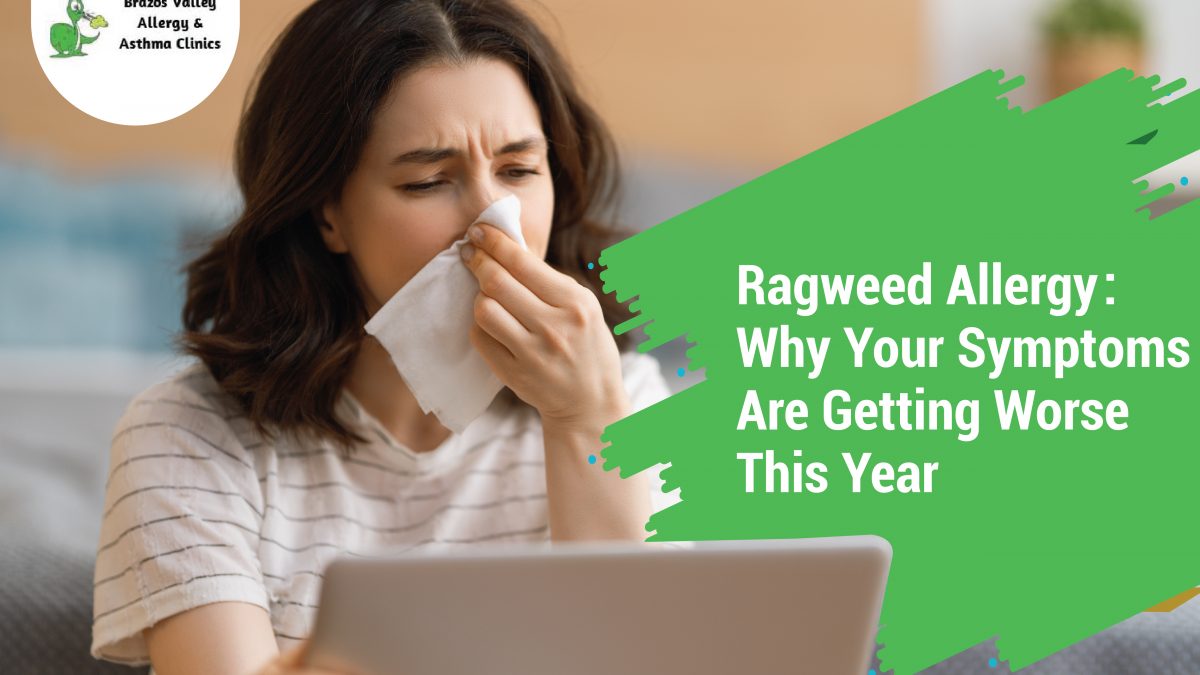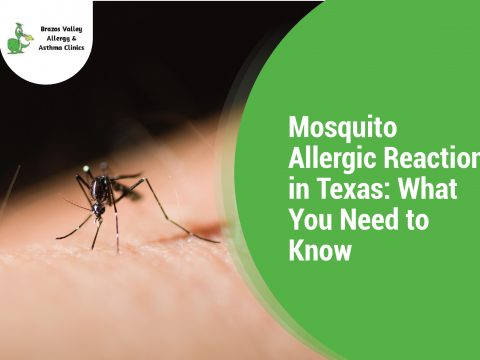- 979-485-9287
- office@bvallergy.com
-
 979-251-7804
979-251-7804
Ragweed Allergy: Why Your Symptoms Are Getting Worse This Year

5 Things You May Not Know About Ragweed Pollen Allergy
July 30, 2021
Treatments and Natural Remedies for Grass and Ragweed Allergy
August 23, 2021If you think 2021 has been one of the worst years for allergy sufferers, you may be right. Experts have seen the changes. So don’t fear. It really has been a rough year. Let’s explore what’s been happening.
Climate Changes
Experts say that climate change plays a big role in worsening allergy symptoms. Pollen is becoming heavier and longer due to increased temperatures and CO2 levels. Also, grasses and ragweed increase their pollen production as a result of localized spikes in CO2 levels, which is caused by pollution generated by cars. Intense allergy seasons have been linked to higher CO2 levels and pollution. As air pollution particles attach to pollen grains, they can erupt into tiny pieces that are easily inhaled. When carbon dioxide (CO2) concentrations rise, it can increase the production of pollen. People with preexisting respiratory ailments, such as asthma, may suffer long-term effects from the increase in pollen counts. Even people who never had allergies before might start experiencing them.
Furthermore, the allergy season is now 10 days longer than in 1990. Grass, trees, and weeds also produce 21% more pollen. If there’s more pollen, then there’s a greater chance for long allergy suffering.
COVID-19 Pandemic
Those suffering from allergies may experience similar symptoms that could be due to COVID-19. It is vital to distinguish between symptoms of allergies and COVID-19.
- Ragweed symptoms, for instance, tend to be predictable and respond well to antihistamines. Occasionally, some of these symptoms can be due to COVID-19 (and not to allergy) and may not respond to antihistamines. The treatment of ragweed symptoms beforehand minimizes confusion with COVID-19.
- Difficulty in breathing is the key sign for COVID-19. Or it might be a sign of a severe allergy reaction. If allergy medications don’t work, a trip to the doctor might be warranted.
Oddly, the COVID-19 precautions last year were a big help for allergy sufferers, thanks to masks, social distancing, face shields, and proper sanitation. However, Covid-19 symptoms resemble allergy symptoms quite closely. Last year, people were mostly staying indoors and wearing protection when going out. This year, people are spending more time outdoors. And more outdoor time means more allergies.
Changes in Seasons
-
- Summer. By the end of the summer, ragweed can become a significant nuisance. Extended warm days in summer can make ragweed pollen spread further. Summer is also prone to air pollution, which makes it difficult to breathe naturally.
-
- Fall. In October, ragweed’s season ends. However, its pollen may still be intact in colder states.
-
- Spring. In February or March, plants begin to release pollen. Spring allergies are also often caused by tree pollen.
-
- Winter. Indoor allergens—pet dander and dust mites can become more of a problem in winter.
Treatments for ragweed allergy symptoms:
Medications
Below are medicines that provide relief:
- Decongestants like Oxymetazoline (Afrin nasal spray)
- Antihistamine and decongestants, such as Actifed and Claritin-D.
- Nasal corticosteroids like fluticasone (Flonase) or mometasone (Nasonex)
Always ask your physician for prescription drugs if over-the-counter medications are ineffective.
Allergy Shots
Allergists recommend allergy shots so that your body can develop a tolerance to ragweed or pollen allergy symptoms. A shot may help prevent allergic reactions. Also, it reinforces your body’s immunity from allergens.
You can also manage your ragweed allergy symptoms by:
Being aware of food triggers
Common and protein-rich foods could also trigger allergies.
- Honey
- Chamomile Tea
- Bananas
- Wheat
- Dairy foods (milk and cheese)
- Sunflower seeds
- Eggs
- Shellfish
- Peanuts
Changing to a healthy lifestyle
A healthy lifestyle keeps an allergy away. Want to get permanent relief from your ragweed allergy? Apply these ways:
- Closing windows from time to time. It blocks allergens from entering your home.
- Once a week, vacuum the house using a HEPA filter.
- After wearing clothing outside, wash it as soon as possible.
- Move to a pollen-free area.
- Dry your clothes in the dryer. Avoid contact with your clothes outdoors, especially during the ragweed pollen season.
- Allow the air conditioner to run for long periods throughout the year.
Setting a reminder
Ragweed is most abundant from August to mid-October. So, always get ahead by contacting your allergist for your ragweed allergy attacks. Consult for the best treatment in advance to avoid severe allergy reactions.
BVAllergy Can Help
Every year, there is a peak time for allergies. Ragweed allergies can worsen if you can’t cope with the situation. That’s why we provide you with solutions in this guide. Moreover, we can provide you with long-term allergy relief, as well.
Paul Jantzi has spent more than 13 years serving the south-central Texas region as an allergist. He is board-certified in allergy and immunology with prior specialty training in pediatrics and internal medicine. Schedule a meeting with him to learn more about immunotherapy and how it can help with your allergy symptoms.




